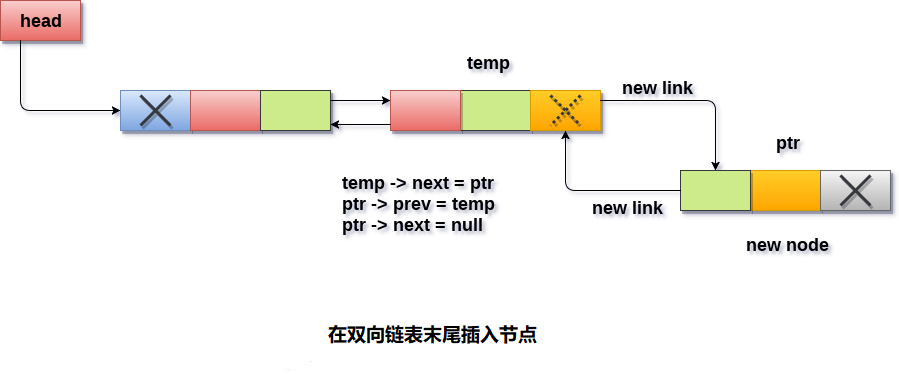要在雙向鏈表的插入節點,要分兩種情況分別處理:鏈表是空的還是包含元素。 使用以下步驟以在雙向鏈表的末尾插入節點。
- 為新節點分配記憶體,使指針
ptr指向要插入的新節點。ptr = (struct node *) malloc(sizeof(struct node)); 檢查鏈表是否為空。如果條件
head == NULL成立,則鏈表為空。 在這種情況下,節點將作為鏈表的唯一節點插入,因此節點的prev和next指針將指向NULL,並且head指針將指向此節點。ptr->next = NULL; ptr->prev=NULL; ptr->data=item; head=ptr;在第二種情況下,條件
head == NULL變為false。新節點將作為鏈表的最後一個節點插入。 為此,需要遍曆整個鏈表才能到達鏈表的最後一個節點。 將指針temp初始化為head並使用此指針遍曆鏈表。temp = head; while (temp != NULL) { temp = temp -> next; }指針
temp指向此while迴圈結束時的最後一個節點。 現在,只需要做一些指針調整就可以將新節點ptr插入到鏈表中。 首先,使temp指針指向要插入的新節點,即ptr。
temp->next =ptr;
使節點ptr的前一指針指向鏈表的現有最後一個節點,即temp。
ptr -> prev = temp;
使節點ptr的next指針指向null,因為它將是鏈表新的最後一個節點。
ptr -> next = NULL
演算法
第1步:IF PTR = NULL
提示 OVERFLOW
轉到第11步
[IF結束]
第2步:設置NEW_NODE = PTR
第3步:SET PTR = PTR - > NEXT
第4步:設置NEW_NODE - > DATA = VAL
第5步:設置NEW_NODE - > NEXT = NULL
第6步:SET TEMP = START
第7步:在TEMP - > NEXT!= NULL 時重複第8步
第8步:SET TEMP = TEMP - > NEXT
[迴圈結束]
第9步:設置TEMP - > NEXT = NEW_NODE
第10步:SET NEW_NODE - > PREV = TEMP
第11步:退出
示意圖 -

C語言示例代碼 -
#include<stdio.h>
#include<stdlib.h>
void insertlast(int);
struct node
{
int data;
struct node *next;
struct node *prev;
};
struct node *head;
void main()
{
int choice, item;
do
{
printf("Enter the item which you want to insert?\n");
scanf("%d", &item);
insertlast(item);
printf("Press 0 to insert more ?\n");
scanf("%d", &choice);
} while (choice == 0);
}
void insertlast(int item)
{
struct node *ptr = (struct node *) malloc(sizeof(struct node));
struct node *temp;
if (ptr == NULL)
{
printf("OVERFLOW");
}
else
{
ptr->data = item;
if (head == NULL)
{
ptr->next = NULL;
ptr->prev = NULL;
head = ptr;
}
else
{
temp = head;
while (temp->next != NULL)
{
temp = temp->next;
}
temp->next = ptr;
ptr->prev = temp;
ptr->next = NULL;
}
printf("Node Inserted\n");
}
}
執行上面示例代碼,得到以下結果 -
Enter the item which you want to insert?
12
Node Inserted
Press 0 to insert more ?
2
